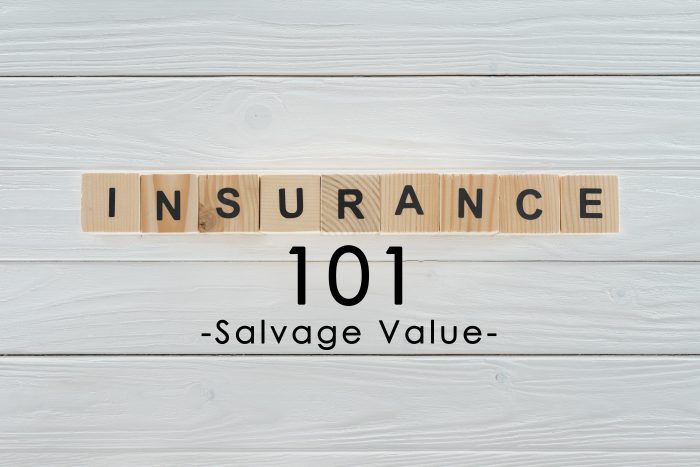Insurance Term of the Day: Salvage Value

The insurance company will use salvage value when your car is a total loss, and you decide to buy it back from them.
When you are in a car accident, a claims adjuster will come view your automobile and assess the damages. If the cost of the damages is three quarters the total value of your car, the adjuster will total out your car. Then, they will offer you the fair market value of your car. However, it is possible that even if the car is totaled, it is still driveable. By law in most states, insurance companies still have to total out the car even if it’s driveable when the damage costs exceed the value. In this case, you can make the decision to keep the damaged car, which is technically considered buying the car back from the insurance company.
The reason for your insurance is for the company to support you financially if something happens to your car. When you file a claim, they are buying your car and offering you the fair market value. When you choose to keep your car, instead of paying the fair market value of the car, they’ll keep a percentage of the total value. This is what’s called the salvage value, which is what the car would be worth if sold for parts. It’s the scrap value of the materials that it can be broken down into. The condition of the operating parts and body parts is taken into consideration when determining the value. The insurance company will determine the actual cash value (ACV) of the car and deduct a certain amount for the salvage value.
When you give your car to the insurance company, this is how the value is determined. ACV – deductible = amount paid.
When you decide to buy your car back from the insurance company, this is how the value is determined: ACV – your deductible amount – salvage value percentage = amount you are paid out on the claim.
Choosing to buy your car back from the insurance company basically means that your car is not of value anymore. In some cases, you will receive what’s called a salvage title, which states that your car has been deemed a total loss by an insurance company. Typically, after a car is deemed totalled, your insurance company will not allow you to add comprehensive/collision coverage on your policy. This means that if you are in another accident following the first, your car is not valuable, and you will receive little or nothing on a payout.
Do you have questions about your insurance? Find an insurance agent near you with our Agent Finder
Search All Blogs
Search All Blogs
Read More Insurance Blogs
Your Safety Net Has a Safety Net: Understanding the Life Insurance “Free Look” Period
Discover your life insurance policy’s “free look” period.
Lightening the Load: A Guide to Decluttering for Your Loved Ones
Declutter for peace of mind, yours and theirs.
Your Life Insurance Recipe: Crafting the Perfect Blend for Your Family’s Future
Find your perfect life insurance mix: Learn how to blend term and permanent policies for optimal family protection.
Embracing Tomorrow: The Practical Power of Planning for Life’s Only Certainty
Face the future with confidence: Understand how planning for life’s only certainty with life insurance can provide lasting security.
Navigating the Grandparenting Journey: Understanding Today’s Families
Grandparenting today: Learn key shifts in family dynamics to build stronger connections with your children and grandchildren.
Finding Your Financial Foundation: Understanding the Minimum Life Insurance You Need
What’s the minimum life insurance you really need? Learn about covering final expenses, debts, and providing immediate financial relief for your family.
Declutter Your Life: Beyond the Physical to a More Streamlined Existence
Tired of clutter? Discover actionable tips to declutter not just your belongings, but also your finances and digital life for a more streamlined and stress-free life.
Your Life Insurance Journey: Start Small, Dream Big, Build Security
Don’t wait for the perfect policy. Discover how starting small with life insurance is the key to building long-term financial security for your family.
Small Steps, Big Impact: Achieving a Healthier Lifestyle Without Radical Overhaul
Forget extreme diets and intense workouts. Learn how simple, everyday choices can add up to a healthier lifestyle.
Weaving Family History: The Power and Importance of a Family Timeline
More than just dates: Crafting a family timeline to connect generations and preserve memories.










